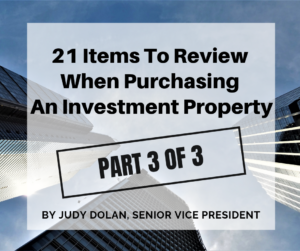21 Items to Review When Purchasing An Investment Property – Part 3

By Judy Dolan, Senior Vice President
This third and final segment of items to review when purchasing an investment property lists seven more items for buyers to review during the inspection/due diligence period. The list of twenty one items is not all inclusive, but it does raise areas where we have seen lack of research and review cost buyers a lot of money post-closing. These costs can be both out of pocket expenses and lack of revenue issues.
- Contracts for the property: Are there any contracts for the property such as landscaping, cleaning, garbage, or other vendors. Do you have to continue those contracts after the sale? Do you even want to continue those contracts after the sale? If the seller hasn’t recently competitively bid its vendors’ contracts, you may be forced into overpaying for services. Make sure you don’t have to assume the seller’s contracts if you don’t want to keep those vendors. Also ensure that you receive a list of the vendors, their contact information, and copies of the contracts during the inspection period so you can review and bid them.
- Historical Vacancy Rates: Research the historical vacancy rate for the area. Is vacancy in the area being absorbed or is it growing? Does the building you are purchasing have a higher or lower vacancy rate than the surrounding area? Can you determine the reason for the higher or lower vacancy rate? Has the building had spaces that sat vacant for years and suddenly they are now leased? If so, is the tenant a tenant that can last or is it a tenant that will leave as soon as the sale is closed, thereby leaving the buyer with an unexpected vacancy?
- Tenant Payment and Collection History: Obtain payment histories for each tenant. Do tenants pay their rent timely? Are there tenants with large collection balances? If there are, you may be evicting tenants shortly after purchasing the property. This will result in legal expenses, vacancies, and possible refurbishing expenses.
- Outstanding or Future Commissions: When reviewing the leases, verify that if there were brokers involved in the leasing, that they have been paid in full. Also verify that there aren’t any “automatic” commissions on tenant renewals for brokers that may have been involved in the initial lease negotiations but are only around to collect a commission on automatic renewals. This may be an unexpected expense in the future.
- Obtain a Property Survey: Obtain an ALTA property survey during your inspection period. This should identify any encroachments, easements, boundary issues. Pay close attention to easements or encroachments. Your real estate attorney can advise you on these items. You don’t want the surprise of a large FPL easement through the middle of your property. Nor do you want the surprise of having less property than you thought was included in the sale.
- Obtain a Phase 1 Environmental Survey: There’s nothing like an environmental clean up to destroy the value of a property. A Phase 1 Environmental Survey takes about 3-5 weeks to complete. It will point out any known issues and may recommend further testing. In a transaction for the purchase of a warehouse, the buyer obtained a Phase 1 Environmental. The Phase 1 had recommendations for further testing. The buyer secured further testing on the property which resulted in remediation. The property that had a purchase price of $1.1 million now had a $250,000 remediation cost. The seller, in order to close, had to put those funds in escrow for the remediation to be completed. The buyer avoided a large expense by having these tests completed during the inspection period. It is highly recommended that a purchaser complete a Phase 1 Environmental for any commercial property purchased, and then a Phase II, if the first study recommends that.
- Read the Appraisal: Even if you are purchasing the property for cash, you should invest in a property appraisal. Read it. Understand it. Does the appraisal value match or exceed your purchase price? If it doesn’t, is there a reason you would still purchase the property for that amount? In some instances, it may be advantageous to over pay a slight amount if you are in a 1031 Exchange and want to avoid capital gain taxes, or if the area is an up and coming area and you believe the property value will increase. Sometimes buyers may over pay because they own the adjacent parcel and the properties together are much more valuable than the individual parcels. If you are going to overpay for a property, know your reasoning and be comfortable with that.









